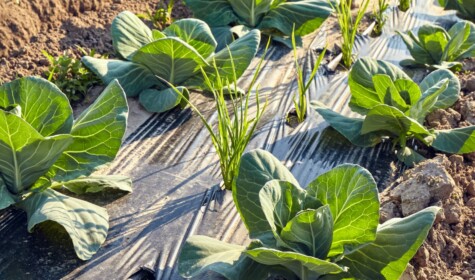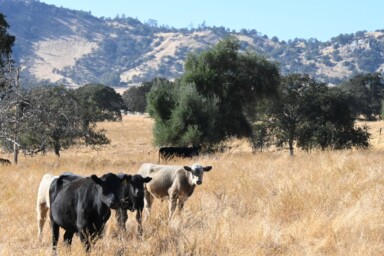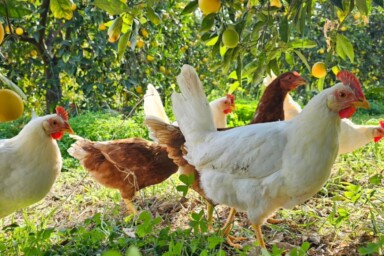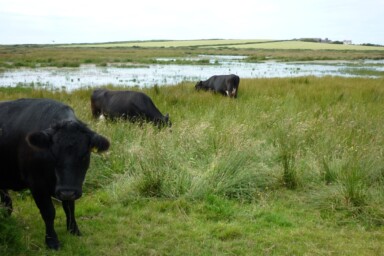In this article, SFT’s Content Editor, Alicia Miller, who manages an organic farm in Wales, considers the huge challenges for all farmers when it comes to reducing their reliance on plastics, while offering some promising examples of highly effective alternatives – many of which have been in use for aeons.
We now all well know how plastic is devastating our seas, but we’re only beginning to realise how damaging it is to our soils and how widely used and poorly disposed of it is in farming. In 2021, the Food and Agriculture Organisation (FAO) published a major report on plastic use in farming. It opened the door on the global scale of farm plastics and pinpointed the root of the problem – currently, farm plastics have only a barely viable end-of-life plan, and the vast majority of these plastics are “burned, buried or landfilled” with record keeping on where they go, almost non-existent. The report further acknowledges that there isn’t “any one single measure that could be applied in isolation in order to facilitate good management practices” – so we are deep down a dark hole in terms of where to go.
Farming and horticulture is now hugely dependent on a wide array of plastics, and this goes for organic, biodynamic and regenerative farms as well. It’s a very hard habit to shake and an even harder one to dispose of. Plastics are used across the gamut of farming, from the ubiquitous silage wrap, usually black but now increasingly in an array of colours, to plastic mulches, agricultural film plastic, seed bags and onwards.
What happens to farm plastics?
Assessing what happens to farm plastics once their usefulness is over has proved very tricky. The Chartered Institute of Waste Management states that, “Around 135,500 tonnes of agricultural plastic waste is produced each year in the UK,” and Defra contends that only 20-30% is turned into new products. The UK has a broad-based requirement for a duty of care in the disposal of agricultural waste. But while this is widely recognised, it may not be widely adhered to. In 2023, the NGO, Environmental Investigation Agency, reported on what happens to UK farm plastics and why they are so problematic to dispose of properly. For starters, there is a basic lack of waste facilities across the UK that deal with farm plastics and costs can be significant for some farmers, but the bigger problem lies in the fact that there is little ‘closed-loop’ recyclability in the way these plastics are manufactured. Further, there are some problematic aspects of farm plastics which largely drive illegal practices: for instance, although there are recyclers who will accept plastic mulches, which are widely used, others may not accept them due to the risk of contamination. But, while there are few, if any, numbers on how many farmers may be burning or burying farm plastic on their land, in relation to how much farm waste is produced each year and how much of this is recycled, there is sure to be a significant discrepancy. With around 216,000 farms in the UK and 17.2 million hectares of land, with what is really a relatively small handful of recyclers that deal with farm waste, it’s not surprising that plastic waste on farms isn’t always treated properly.
On the upside of these problems, however, is the Green Tractor scheme, which involves farmers with a commitment to innovation and environmental change, supporting them to be accountable for their waste. The scheme reprocesses waste back into usable plastic.
The threat of microplastics
Microplastics (MPs) are now pervasive through soils in Britain – and the wider world, sadly. The development of plastic mulches in the 1970s has been particularly impactful along with the practice of using sewage sludge for soil improvement, which can carry MPs and other contaminants. MPs are generated through the breakdown of larger plastics over time, gradually degrading to increasingly smaller residues. They are then worked upon by both chemical and biological processes, including water and more concerningly, earthworms.
It’s now well recognised that soil is significantly affected by the presence of MPs in the soil environment and they are currently, an “emerging contaminant” of concern – i.e. any synthetic or natural chemicals or microorganisms that are not widely monitored and can cause known or unknown ecological or human health effects. There is an array of evidence that MPs impact soil structure, moisture diffusion, microbial activities, crop development, seed germination, nutrient availability, and ultimately threaten the soil ecology and the wider environmental ecosystem due to their persistence and toxicity.
It may come as something of a surprise that it’s not just conventional soils that are polluted with MPs – organic soils are also polluted with them, a testament to how pervasive they are throughout the world. While ‘bio’-mulches are widely used in organic agriculture, especially horticulture, there is evidence that they share many of the problems of conventional plastic mulches and have been found to be “carcinogenic, mutagenic, endocrine disrupting and bio-accumulative” and they can also carry some plastic.
Changing our ways
But as plastics become ever more heavily relied upon, it’s easy to forget that we didn’t used to have them and there are a number of practices that could be substituted. Farmers once used straw or other organic matter instead of plastic mulch. Cover crops can also play an important role in opening up the soil, improving access to water and supporting moisture infiltration and retention. And they function as a natural mulch when they finish.
There are also new sustainable innovations to be considered. The Soil Association’s Innovative Farmers programme has trialled a range of commercial mulches, both non-degradable and biodegradable. The group assessed a variety of materials, starting with the non-degradable mulches, in terms of effectiveness – this included cardboard, green waste, straw and hay, wood and woodchip, grass, green waste, under-sown mulches, compost and biodegradable film – as alternatives to non-degradable mulches. The value lay in identifying less impactful mulches that could help farmers move towards alternatives – woodchip came out on top.
Moving away from plastics – and fossil fuel use altogether
Farmers and growers are beginning to wake-up to the realisation of how pervasive plastics are, even in organic and other sustainable practices, and many are starting to rethink ways to move away from them. Farmer Stuart Oates based in Cornwall is on a journey not just to remove plastics from his farm, but also to eventually eliminate fossil fuels entirely – not a mean feat. His first project is to start using sisal string instead of baler twine and net wrap, a relatively simple transition that also helps those producing sisal to make a better living. Oates reckons that the hay he makes, is tied with baler twine and that the microplastics in it could quite possibly be going through his cattle – “It’s madness to me,” he says. Oates has proposed a new trial for the Innovative Farmers programme focused on sisal. “These are small changes,” says Oates, “that’s something that we can do now. Small changes can make a huge difference.”
To learn more about using plastic-free woodchip mulches, tune in to our two-part podcast episode with organic pioneer, Iain ‘Tolly’ Tolhurst. Find it on our podcast page along with more conversations with leading figures from the world of sustainable food and farming.






